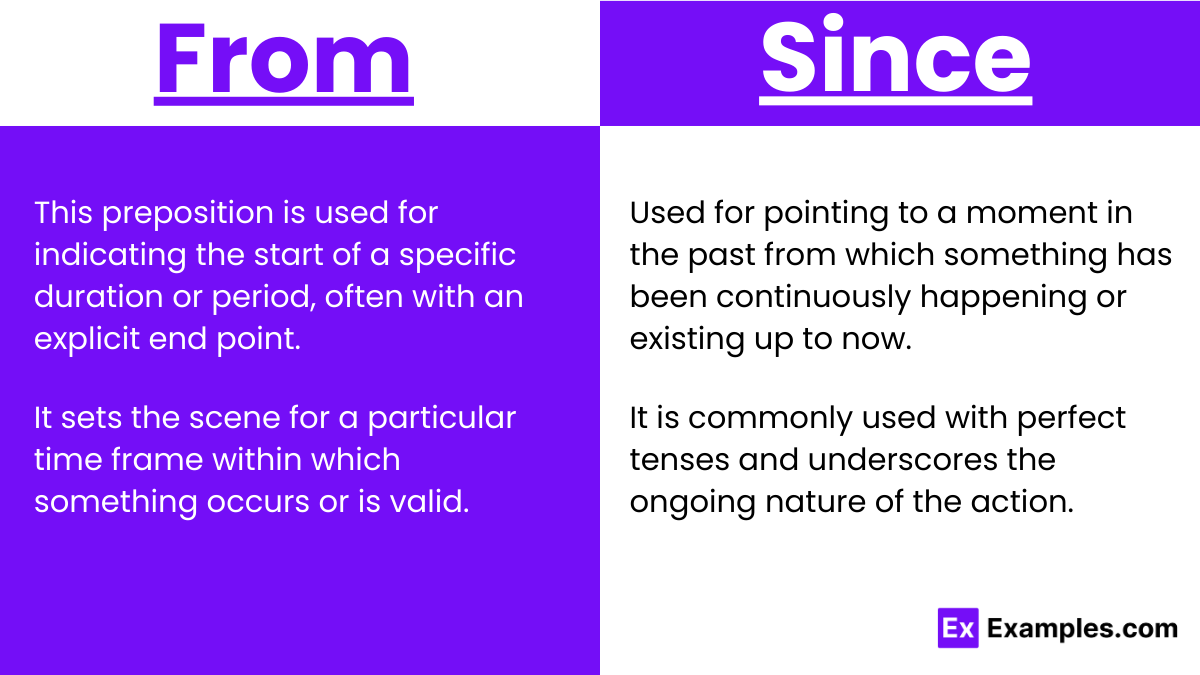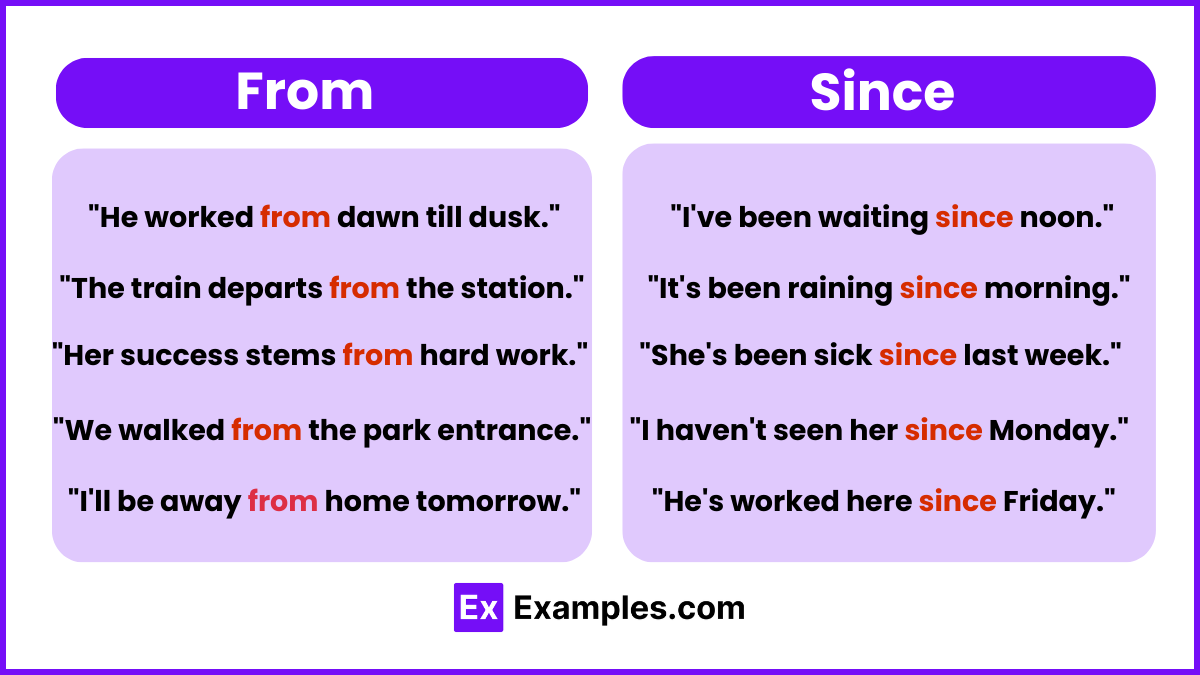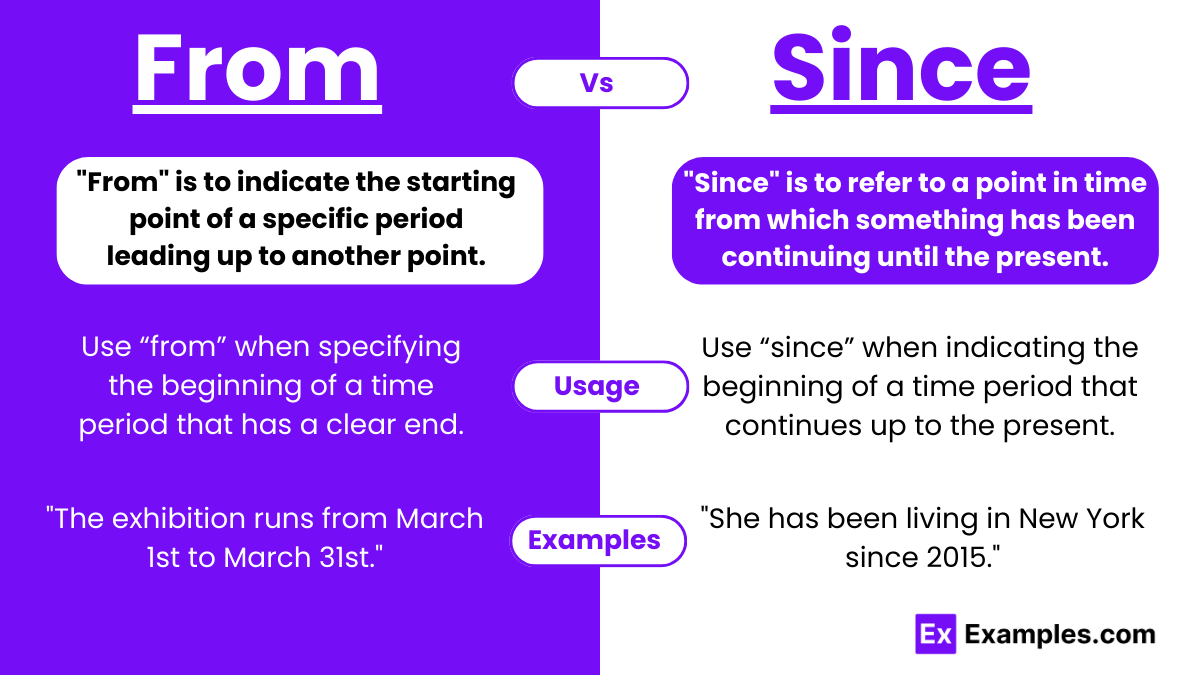From vs Since – Difference, Meanings, Examples, Usage
In this piece, we’re diving into the words ‘from‘ and ‘since,’ both of which help us talk about the start of something. ‘From‘ is used to show the beginning point of an action or a time period, like saying ‘from January to March.’ On the other hand, ‘since‘ is used when we’re talking about a specific point in time up to now, like ‘since 2010.’ We’ll make it simple with clear examples and handy tips, so you’ll know exactly when to use each word.
From and Since – Meanings
- From: “From” is used to indicate the starting point of a specific period or range of time, leading up to another point. It is often used in combination with “to” or “until” to specify the end point of the time period. The use of “from” emphasizes the duration between two points.
- Since: “Since” is used to refer to a point in time from which something has been continuing until the present or until the time of speaking. It is often used with perfect tenses and emphasizes the continuity from the past until now, without necessarily specifying an end point.
Summary
Both “from” and “since” mark the beginning of a time period, but they are used in different contexts. “From” is used to talk about a specific range or duration of time, usually with a clear end point. “Since” is used to indicate the start of a time period that continues up to the present, emphasizing ongoing duration.
How to Pronounce From and Since
- From: Pronounced as /frəm/ or /frɒm/ (frum or from).
- Since: Pronounced as /sɪns/ (sins).
Differences between From and Since
| Aspect | From | Since |
|---|---|---|
| Connotation | Neutral; indicates a specific range of time with a start and often an end point. | Positive or neutral; suggests continuity from a past point until now. |
| Usage | Used to specify the start of a time period, often with an end point indicated by “to” or “until”. | Used to refer to the start of a time period continuing until the present, usually without a specified end. |
| Example Context | “I will be on vacation from Monday to Friday,” indicating a clear time range. | “I have been working here since 2010,” emphasizing ongoing action since a past point. |
| Temporal Reference | Indicates a fixed duration or range of time. | Indicates a point in time extending to the present or until the speaking moment. |
| Effect on Reader/Listener | Imparts information about a specific time range. | Conveys the continuity or persistence of something over time. |
| Nuance in Sentence | Often used in contexts where the duration or the end point of an action is relevant. | Used to emphasize the length of time something has been happening, without focusing on its end. |
How to Remember the Difference between From and Since
To remember the distinction between “from” and “since,” consider that “from” typically requires a starting point and an ending point (e.g., from Monday to Friday), indicating a specific duration. “Since” points back to a specific moment in the past and extends to the present, often used with perfect tenses to emphasize ongoing duration (e.g., since 2010).
When to Use From and Since

Usage of From
Use “from” when specifying the beginning of a time period that has a clear end or is defined by a range.
From: This preposition is suitable for indicating the start of a specific duration or period, often with an explicit end point. It sets the scene for a particular time frame within which something occurs or is valid.
- Specifying Time Range: Indicates a clear start and often an end point.
- Describing Changes: Useful for showing transition over time.
- Historical References: For citing events within a specific period.
- Comparative Contexts: When comparing situations at two different times.
Usage of Since
Use “since” when indicating the beginning of a time period that continues up to the present.
Since: Ideal for pointing to a moment in the past from which something has been continuously happening or existing up to now. It is commonly used with perfect tenses and underscores the ongoing nature of the action or state.
- Continuous Action: Highlights ongoing actions since a past point.
- Ongoing Conditions: For situations that have persisted from a past moment.
- Time-Related Explanations: When explaining the duration of ongoing situations.
- Emphasizing Duration: To stress how long something has been happening.
How to use From and Since
From
“From” is used to indicate the starting point of a physical movement, a range in time or space, the origin, cause, or source of something, or the material out of which something is made. Here are some examples of its use:
- Start Points: “From” is used to indicate the beginning of a range, either in terms of time (“from January”) or space (“from the doorway”).
- Origin/Source: It denotes the origin of something or someone (“from Italy”) or the source of information (“from a book”).
- Material: Specifies the materials something is made from (“from wood”).
- Causation: Links a cause to its effect, particularly for reactions or conditions resulting from specific factors (“from the cold”).
Since
“Since” is primarily used to refer to a point in time from which something has started and continues into the present. It is often used with perfect tenses. Here are some examples:
- Temporal Continuity: “Since” connects a past event to the present, highlighting that something has been ongoing since that past point (“since 2010”).
- Causal Reasoning: Less commonly, it introduces a reason or cause, similar to “because” (“since you asked”).
From and Since – Examples

Examples of From
- The exhibition runs from March 1st to March 31st.
- She will be working from home next week.
- The library is open from 9 AM to 5 PM.
- He studied French from 2004 to 2008.
- We walked from the park to the museum.
Examples of Since
- She has been living in New York since 2015.
- I haven’t seen him since the party last month.
- He has been working on the project since January.
- It has been raining since this morning.
- We have known each other since childhood.
Synonyms
| From | Since |
|---|---|
| Starting | Beginning |
| Originating | Commencing |
| Outset | Inception |
| Departure | Since |
| Source | As |
Exercise
- I have been studying Spanish ________ last year.
- The museum is open daily ________ 9 AM to 5 PM.
- We’ve known each other ________ we were children.
- The conference runs ________ Monday ________ Wednesday.
- He hasn’t called me ________ the day we met.
- The shop will be closed ________ December 24th ________ January 2nd.
Answers
- since
- from
- since
- from / to
- since
- from / to
FAQ’S
What is the difference between since and from a date?
Since indicates the starting point of actions or events. From specifies a range’s beginning, often used with “to” or “until.”
Where do I use since?
Use since to refer to a specific point in time when talking about durations, typically with perfect tenses in English.
What is the difference between if and since?
If introduces a conditional situation. Since explains a reason or a time starting point, often indicating causality or a time lapse.
Can since and from be used together?
Yes, since and from can be used together for emphasis, often in formal contexts, indicating a period’s start and its significance.
What is the major difference between since and for?
Since refers to a point in time, showing the start. For indicates a duration, focusing on the length of time.


